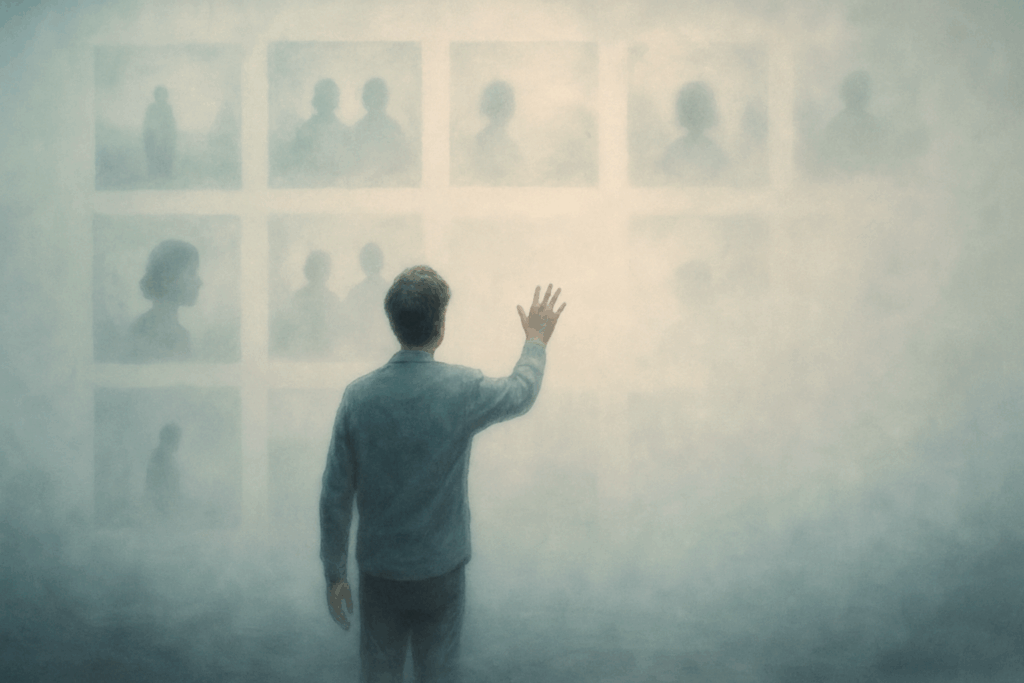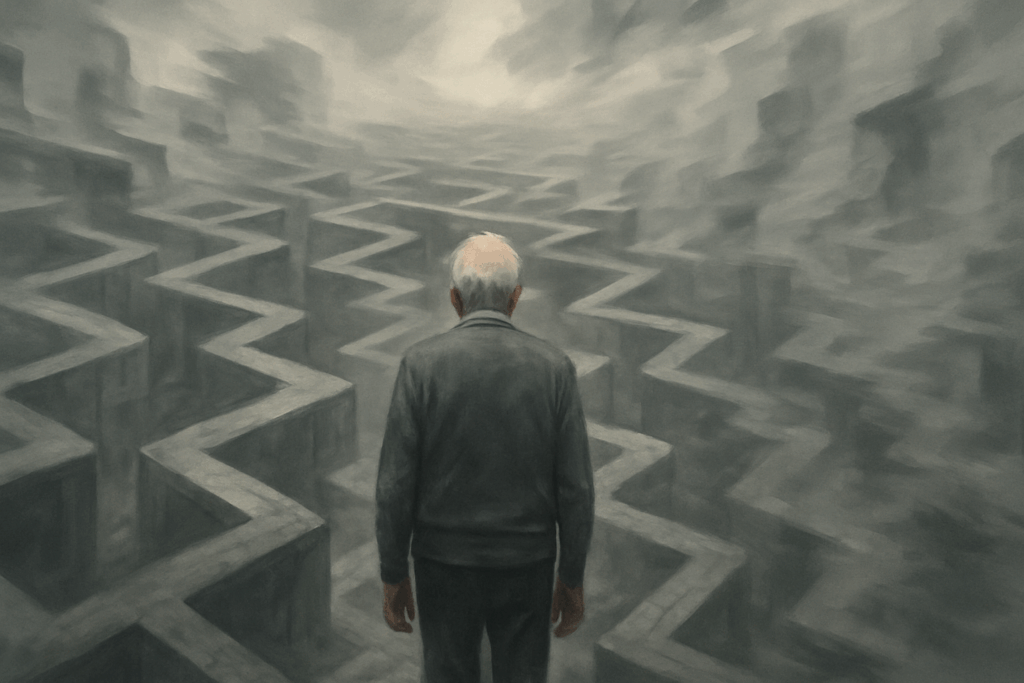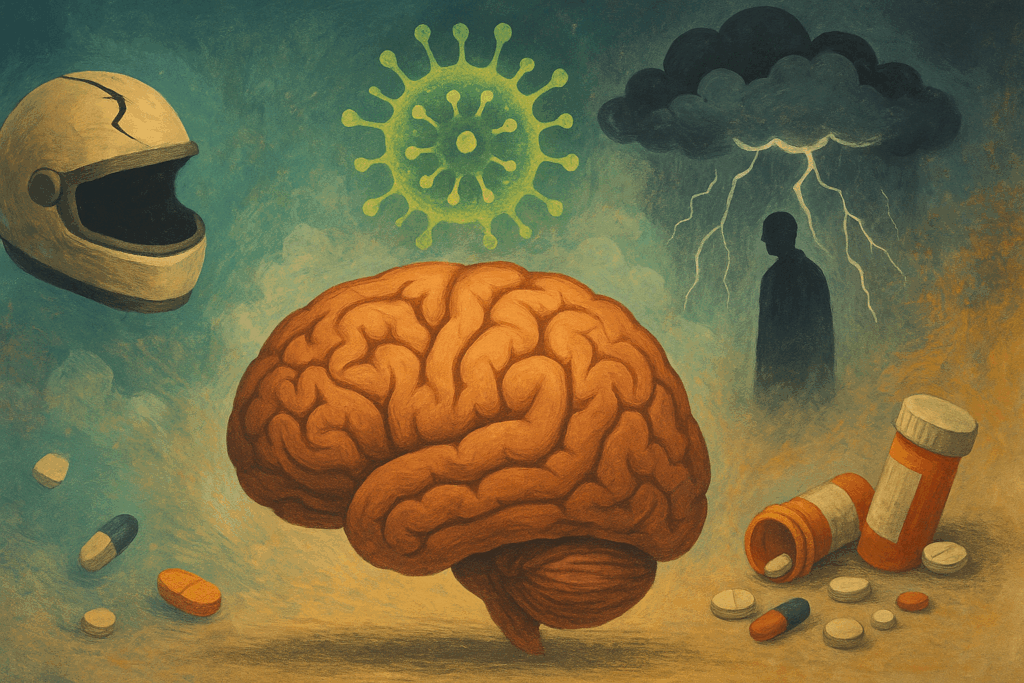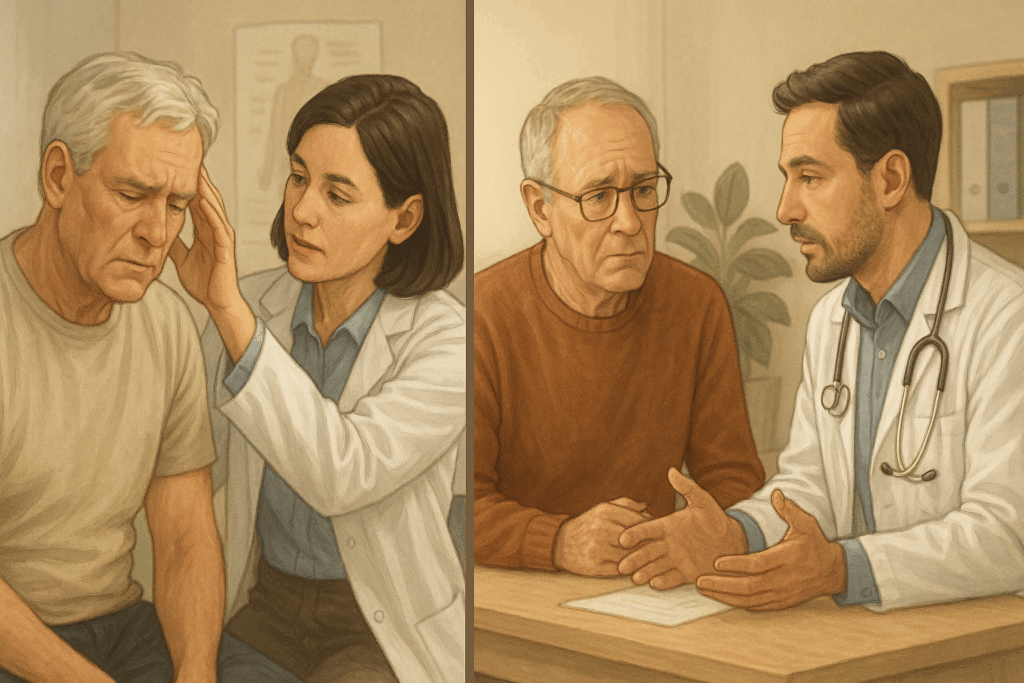Understanding Memory Loss: A Complex and Often Misunderstood Symptom
Memory loss is a phenomenon that captures public imagination in profound ways, often serving as the centerpiece of novels, films, and emotional personal narratives. However, in clinical reality, it is a complex and multifaceted symptom that demands careful examination. Two terms commonly encountered when discussing memory problems are “amnesia” and “dementia.” Although they may appear similar at first glance, a deeper exploration reveals that these conditions are distinct in their origins, manifestations, and implications for long-term health. For individuals concerned about themselves or a loved one, understanding the difference between amnesia vs dementia is crucial for seeking appropriate care and intervention.
You may also like: Best Herb for ADHD Support: How Natural Remedies and Herbs for ADHD Women May Help Boost Focus and Calm
When facing memory issues, it is important to distinguish between transient episodes of forgetfulness and underlying neurological disorders. Everyday forgetfulness, such as misplacing keys or momentarily forgetting a name, can occur due to stress, lack of sleep, or even the natural aging process. In contrast, both amnesia and dementia involve more significant disruptions to memory and cognitive functions, but they do so in markedly different ways. Recognizing the differences between amnesia and dementia helps in identifying early warning signs and deciding when to seek professional help.

Defining Amnesia: What Happens When Memory Disappears
Amnesia is a condition characterized primarily by memory loss, but it is important to note that not all types of memory are affected equally. In cases of amnesia, individuals may experience difficulty forming new memories, recalling past events, or both. Unlike dementia, amnesia typically does not impact other cognitive functions such as reasoning, problem-solving, or language skills. This distinction is pivotal in differentiating amnesia vs dementia.
There are several types of amnesia, each with unique causes and presentations. Anterograde amnesia refers to the inability to form new memories following the event that caused the condition, such as a traumatic brain injury. Retrograde amnesia involves the loss of memories formed before the onset of amnesia. Sometimes, a combination of both types can occur, leading to profound disorientation and distress. Emotional trauma, neurological diseases, infections like encephalitis, or substance abuse can also contribute to various forms of amnesia.
Understanding the scope and nature of amnesia requires appreciating that memory is not a singular, monolithic faculty. Instead, memory comprises multiple systems and processes, including short-term memory, long-term memory, episodic memory (personal experiences), and procedural memory (how to perform tasks). In many cases, people with amnesia retain procedural memory, enabling them to perform learned tasks like riding a bicycle, even if they cannot recall personal milestones.

Exploring Dementia: A Broader Decline in Cognitive Abilities
In contrast to amnesia, dementia encompasses a broad decline in cognitive functioning that extends beyond memory impairment. While memory loss is a hallmark of dementia, it is accompanied by deterioration in other cognitive domains such as language abilities, executive function, visual-spatial skills, and social cognition. Thus, the comparison between amnesia vs dementia is not merely about severity but about the scope and progression of cognitive decline.
Dementia is not a specific disease but rather a syndrome—a collection of symptoms resulting from damage to the brain. Alzheimer’s disease is the most common cause of dementia, but other forms include vascular dementia, Lewy body dementia, and frontotemporal dementia. Each type has its own distinct patterns of progression and underlying pathophysiology, yet all share the feature of interfering with daily life activities and independence.
Unlike amnesia, which can sometimes be temporary or treatable depending on the cause, dementia is typically progressive and irreversible. Early symptoms of dementia may include subtle changes in memory, difficulty finding words, changes in mood or behavior, and impaired judgment. As the condition advances, individuals may lose the ability to recognize loved ones, perform basic tasks, or maintain personal hygiene.

Key Differences Between Amnesia and Dementia
Understanding the differences between amnesia and dementia can help in recognizing the appropriate signs and determining when medical evaluation is necessary. One major distinction lies in the affected cognitive domains. In amnesia, the primary disruption is in memory, while other cognitive faculties remain relatively intact. In dementia, memory impairment is one part of a more extensive deterioration of multiple cognitive functions.
The onset and progression of symptoms also differ. Amnesia often has an acute onset, meaning it occurs suddenly after an event like trauma or infection. In contrast, dementia develops insidiously over months or years, gradually worsening over time. This gradual decline can make early detection challenging, as initial symptoms may be subtle and easily attributed to normal aging.
Another important difference is reversibility. Some cases of amnesia, particularly those caused by head injuries, emotional trauma, or infections, can improve with treatment or spontaneously over time. Conversely, dementia, especially when caused by neurodegenerative diseases like Alzheimer’s, is generally irreversible and progressive, requiring long-term management rather than curative treatment.
Causes of Amnesia: Understanding the Triggers
The causes of amnesia are diverse and often complex. Physical trauma, such as a blow to the head, can result in damage to brain regions responsible for memory storage and retrieval. The hippocampus, located in the medial temporal lobe, is particularly vulnerable. Infections like herpes simplex encephalitis can lead to inflammation and subsequent memory deficits. Additionally, stroke, tumors, and oxygen deprivation to the brain (anoxia) are known to cause amnesia.
Psychological trauma can also lead to a specific type of amnesia called dissociative amnesia, where the mind blocks access to memories associated with a stressful or traumatic event. Unlike organic amnesia, dissociative amnesia is primarily a psychological defense mechanism and may resolve spontaneously or with therapeutic intervention.
Certain medications, alcohol abuse, and nutritional deficiencies, especially vitamin B1 deficiency leading to Wernicke-Korsakoff syndrome, are other known contributors. Understanding the underlying cause of amnesia is critical for determining the appropriate course of treatment and prognosis.

Causes of Dementia: A Multifaceted Syndrome
Just as amnesia has a range of causes, so too does dementia. Neurodegenerative diseases, where neurons progressively lose function and die, are the most common culprits. Alzheimer’s disease accounts for 60-80% of dementia cases and is characterized by the buildup of amyloid plaques and tau tangles in the brain, leading to cell death.
Vascular dementia results from conditions that block or reduce blood flow to the brain, depriving neurons of necessary oxygen and nutrients. Strokes or small vessel disease are typical underlying factors. Lewy body dementia involves abnormal protein deposits, while frontotemporal dementia primarily affects the frontal and temporal lobes, influencing personality and behavior.
Other causes include chronic traumatic encephalopathy from repeated head injuries, infections like HIV, and reversible conditions such as thyroid problems or vitamin deficiencies. Identifying the specific cause of dementia allows for more targeted management strategies, although cures remain elusive for most forms.
Symptoms and Diagnosis: What to Watch For
Recognizing symptoms early can make a significant difference in managing both amnesia and dementia. In amnesia, sudden memory loss following an injury or traumatic event should prompt immediate medical evaluation. Difficulty learning new information, confusion, and disorientation are typical indicators. Importantly, individuals with amnesia often retain self-awareness and can understand that they are experiencing memory loss.
In dementia, symptoms progress slowly and may initially manifest as forgetfulness that disrupts daily life. Struggling with familiar tasks, difficulty following conversations, mood changes, and impaired judgment are early warning signs. Over time, disorientation to time and place, poor decision-making, and withdrawal from social activities become more pronounced. Unlike those with amnesia, individuals with dementia may lack insight into their cognitive decline.
Diagnosis typically involves a comprehensive assessment, including medical history, neurological examinations, cognitive tests, brain imaging, and sometimes laboratory studies to rule out reversible causes. Differentiating between amnesia vs dementia during diagnosis requires careful attention to the breadth and nature of cognitive deficits.
Treatment Options and Management Strategies
Treatment approaches differ significantly between amnesia and dementia due to their differing etiologies and prognoses. In cases of amnesia, addressing the underlying cause is paramount. This may involve treating infections, managing trauma, correcting nutritional deficiencies, or providing psychological support. Cognitive rehabilitation, memory exercises, and structured routines can help individuals compensate for memory loss.
For dementia, while no cure exists for most types, management focuses on slowing progression, alleviating symptoms, and supporting quality of life. Medications such as cholinesterase inhibitors and memantine may offer modest benefits in cognitive symptoms. Behavioral therapies, occupational therapy, and environmental modifications help maintain independence and reduce caregiver burden.
Lifestyle modifications play an essential role in dementia management. Regular physical exercise, a heart-healthy diet, cognitive stimulation, and social engagement have been shown to support brain health. Educating caregivers and offering psychosocial support are equally important in providing comprehensive care.
When to Seek Help: Recognizing the Critical Signs
Knowing when to seek medical attention can profoundly affect outcomes for individuals experiencing memory issues. A sudden onset of memory loss, confusion, or disorientation following trauma or illness warrants immediate evaluation to rule out serious conditions like stroke or brain injury. In the context of amnesia and dementia, early diagnosis opens the door to interventions that may slow progression or, in some cases, reverse symptoms.
Persistent memory problems that interfere with daily life, repeated questions, getting lost in familiar places, and noticeable changes in behavior should not be dismissed as “normal aging.” Consulting a neurologist or a memory specialist can provide clarity and guidance. Memory loss is a symptom, not a normal part of growing older, and addressing it early offers the best chance for optimal management.
The Emotional Impact on Individuals and Families
Memory loss, whether from amnesia or dementia, carries significant emotional consequences. Individuals experiencing memory problems often grapple with fear, frustration, and a profound sense of loss. They may feel alienated from their former selves and fearful of further decline. Families, too, experience grief and helplessness as they watch a loved one change in ways they cannot control.
In cases of amnesia, the hope of recovery can provide emotional resilience, but the unpredictability of outcomes creates ongoing anxiety. For dementia, the progressive nature of the illness requires families to adapt continuously, often becoming caregivers with significant emotional and physical burdens. Support groups, counseling, and educational resources are vital in helping both patients and families navigate these challenges with dignity and strength.
Looking Toward the Future: Research and Hope
Advances in neuroscience continue to offer hope for individuals facing memory loss. Research into the underlying mechanisms of memory formation and storage holds promise for developing new treatments for amnesia. Meanwhile, efforts to better understand the pathophysiology of dementia are yielding potential disease-modifying therapies, such as anti-amyloid antibodies for Alzheimer’s disease.
Preventative strategies are also gaining attention. Promoting brain health through lifestyle interventions, early detection, and risk factor modification offers a proactive approach to reducing the burden of dementia. Public awareness campaigns aimed at reducing stigma and encouraging early intervention are critical components of this effort.
Understanding the nuances of amnesia vs dementia empowers individuals to take action, seek help, and advocate for themselves and their loved ones. Memory loss need not be a silent struggle; with knowledge, support, and compassionate care, it becomes a challenge that can be met with resilience and hope.

Frequently Asked Questions: Amnesia vs Dementia
What are some early signs that distinguish amnesia from dementia?
Early signs often help differentiate amnesia vs dementia, although the distinction can be subtle. In cases of amnesia, individuals might suddenly struggle with forming new memories or recalling specific events, yet their reasoning, language, and problem-solving abilities remain intact. By contrast, dementia usually presents with a gradual decline across multiple cognitive domains, such as language, decision-making, and orientation. People experiencing dementia may forget not just isolated events but also lose track of time, places, and even close relationships. Understanding these early differences in amnesia and dementia can prompt quicker access to the right kind of medical evaluation and support.
Can emotional trauma cause symptoms similar to dementia?
While dementia typically results from physical changes in the brain, severe emotional trauma can cause symptoms that mimic memory loss, often leading to confusion between amnesia vs dementia. Trauma-induced amnesia, such as dissociative amnesia, might involve gaps in autobiographical memory but does not usually affect other cognitive functions like language or reasoning. However, long-term emotional trauma, especially if untreated, can increase the risk of developing true cognitive decline later in life. Differentiating between trauma-related memory loss and progressive dementia requires thorough psychological and neurological assessments. Recognizing the emotional roots behind certain symptoms ensures individuals receive proper therapeutic intervention rather than inappropriate dementia diagnoses.
How do lifestyle choices influence the risk of amnesia and dementia?
Emerging research highlights the role of lifestyle choices in shaping brain resilience, although the pathways for amnesia vs dementia differ. For example, chronic alcohol misuse can lead to Wernicke-Korsakoff syndrome, a type of amnesia linked to thiamine deficiency. On the other hand, dementia risk is influenced by factors like hypertension, smoking, obesity, and lack of physical or cognitive activity. Adopting heart-healthy habits such as regular exercise, a balanced diet rich in antioxidants, and continuous mental stimulation has shown promise in reducing dementia risk. Similarly, avoiding head trauma and substance abuse plays a crucial role in preventing forms of amnesia and dementia that could otherwise compromise long-term brain health.
Is recovery possible in cases of amnesia but not dementia?
One key clinical distinction between amnesia and dementia is the potential for recovery. Some forms of amnesia, particularly those stemming from trauma, substance use, or infections, may be reversible, with memory partially or fully returning over time. Rehabilitation programs focused on cognitive therapy and structured routines can significantly aid recovery in these cases. Unfortunately, dementia, especially when associated with Alzheimer’s disease or other neurodegenerative conditions, is progressive and typically irreversible. However, early intervention and symptom management can slow its course, highlighting the importance of understanding differences in prognosis between amnesia vs dementia.
How does age impact the likelihood of developing amnesia or dementia?
Age plays a critical role in differentiating the prevalence of amnesia and dementia. Dementia primarily affects older adults, with risk doubling approximately every five years after age 65. By contrast, amnesia can occur at any age, particularly when triggered by head injuries, infections, or psychological trauma. Younger individuals experiencing sudden memory loss are often more likely to suffer from amnesia rather than dementia. This distinction underlines why a detailed medical history and situational context are vital in evaluating memory concerns. Understanding how age interacts with the patterns of amnesia vs dementia allows for better-targeted assessments and interventions.
Are there specific brain regions more affected in amnesia compared to dementia?
Yes, the brain regions impacted differ significantly between amnesia vs dementia. In amnesia, damage often centers on the hippocampus and surrounding medial temporal lobe structures, critical areas for encoding and retrieving memories. In contrast, dementia involves more widespread brain damage, often beginning with the hippocampus but eventually affecting the cerebral cortex, responsible for higher-order cognitive functions like language and problem-solving. Different types of dementia, such as frontotemporal dementia, target specific brain regions related to personality and behavior rather than memory alone. Knowing which brain structures are involved enhances diagnostic accuracy and informs tailored therapeutic strategies for amnesia and dementia.
Can medications mimic symptoms of amnesia or dementia?
Medication side effects can sometimes create symptoms that make it difficult to distinguish amnesia vs dementia. Certain sedatives, antihistamines, antidepressants, and even cholesterol-lowering drugs have been associated with cognitive impairment or short-term memory issues. These medication-induced cognitive changes are typically reversible once the offending drug is discontinued. However, misattributing medication effects to a permanent condition like dementia can lead to unnecessary anxiety and mismanagement. Physicians carefully review medication histories when evaluating new memory complaints, as this context is critical for distinguishing between drug-induced cognitive changes and true cases of amnesia and dementia.
How do family and social environments affect outcomes in memory disorders?
Family support and social engagement are vital in influencing outcomes for individuals with amnesia and dementia, although the impact differs depending on the diagnosis. For people with amnesia, structured environments that reinforce memories through repetition and cues can significantly aid rehabilitation. Meanwhile, individuals with dementia benefit greatly from emotional support, routine, and social interaction, which help preserve cognitive function for as long as possible. Loneliness and social isolation are risk factors for worsening cognitive decline, particularly in dementia. Creating an environment rich in meaningful interactions can therefore alter the trajectory of both amnesia vs dementia by enhancing quality of life and fostering resilience.
Are there new diagnostic tools emerging for early detection of memory disorders?
Innovations in diagnostic technology are advancing the early detection of amnesia vs dementia. For example, functional MRI (fMRI) scans can reveal disruptions in brain network connectivity long before traditional structural changes appear. Biomarkers in blood or cerebrospinal fluid, such as beta-amyloid or tau proteins, are becoming more reliable indicators of Alzheimer’s disease, offering a glimpse into dementia’s progression before overt symptoms emerge. For amnesia, new protocols using advanced neuroimaging techniques can more precisely localize memory-processing deficits. These breakthroughs hold promise for initiating earlier, more effective interventions tailored to the specific needs of individuals grappling with either amnesia and dementia.
What role does neuroplasticity play in managing memory disorders?
Neuroplasticity, the brain’s ability to reorganize and form new neural connections, is a critical concept when managing both amnesia and dementia. In amnesia, leveraging neuroplasticity through targeted cognitive rehabilitation exercises can sometimes help the brain “work around” damaged areas and recover lost functions. While dementia involves progressive loss of brain cells, cognitive stimulation therapies seek to harness residual neuroplasticity to delay cognitive decline. Understanding neuroplasticity’s role deepens our appreciation for the dynamic nature of the brain and offers hope for improving quality of life despite the challenges posed by amnesia vs dementia. Fostering brain adaptability through lifestyle interventions, therapies, and supportive environments remains a cornerstone of contemporary memory disorder management.

Conclusion: Recognizing the Differences Between Amnesia and Dementia for Better Outcomes
In the often-overwhelming landscape of cognitive health, differentiating between amnesia vs dementia is essential for securing timely and appropriate care. Amnesia and dementia are distinct conditions with differing causes, symptoms, and trajectories. While amnesia often centers on isolated memory loss and may be reversible, dementia represents a progressive decline across multiple cognitive domains that impacts daily life on a profound level.
Recognizing the early signs of memory issues, understanding their broader context, and seeking professional help without delay can dramatically improve outcomes. As research continues to unravel the mysteries of the brain, the future holds promise for more effective treatments and better support systems. Embracing a proactive, informed approach allows individuals and families not only to navigate the complexities of memory loss but also to maintain hope, dignity, and quality of life amid the challenges.
By fostering an informed understanding of amnesia and dementia, we contribute to a world where memory loss is met with compassion, expertise, and unwavering support.
Was this article helpful? Don’t let it stop with you. Share it right now with someone who needs to see it—whether it’s a friend, a colleague, or your whole network. And if staying ahead on this topic matters to you, subscribe to this publication for the most up-to-date information. You’ll get the latest insights delivered straight to you—no searching, no missing out.
Further Reading:
What’s the Difference Between Amnesia and Dementia?


